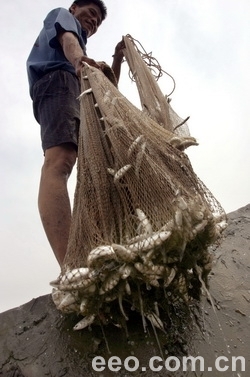

Nation, Page 9
July 15, 2011
Translated by Song Chunling
Original article: [Chinese]
Ding Wenxiang (丁文祥), a 64-year old fisherman from Hubei in southern China, didn’t enjoy his trawl when he took the Yangtze on July 1 for the first time since April when the annual non-fishing period began.
Compared with 10 years ago, “there is almost nothing to fish,” he says, adding that the slump was clear after the construction of Gezhou Dam (葛洲壩) and the Three Gorges Dam (三峽工程).
Ding from a professional fishing village in Jianli County(監(jiān)利縣). Since 2002 he has had to stop work each year from April 1 to June 30 for a government ban on fishing.

The Last Professional Fishermen
Ding is part of a so-called "boat family" (連家漁船) – he lives on his boat. There are 730 such “families” in Jianli. Before the reforms, the fishing village was transformed into a cooperative, and the fishermen were registered as non-agricultural workers.
Ding’s family has been fishing for three generations, but his five daughters and one son have moved off the water. Jiangli’s fishing cooperatives are now mostly old men like Ding and only have 40 or 50 boats, far less than before.
Since the non-fishing period started in 2002 at Yangtze River, life has become increasingly difficult, says Chen Changpeng(陳長鵬), a 30-year-old member of the cooperative. Chen stayed in the village because “nobody else wants me since I didn’t have much of an education and don’t have any specific skill.” During the three months that the river is closed for fishing, Chen earns 30 or 40 yuan pay each day taking on short-term work in factories.
“At first we ignored the ban and went fishing as usual because we can’t earn a living without fishing. The Fisheries Department stopped us and dispersed our boats,” says Chen. Although the government paid a monthly allowance of 100 yuan per boat to tide them over during the three-month closed season, that’s scant compensation for the 7,000 or 8,000 yuan that they used to earn over the three month period.
Therefore, more and more young fishermen have left and started working in factories, but it’s hard for older fishermen like Ding to move off the river since they don't own land or houses and aren’t entitled to the same welfare benefits as farmers. Ding, who suffers from rheumatism, is stuck on his boat.
Some better-off families from Ding’s cooperative have started renting houses, while bigger fishing communities elsewhere qualify for support from the government’s “Fishermen on land” (漁民上岸) program.
In the 1980s, 11 Yangtze River fishing villages were given houses on land, but Ding never had an opportunity like this because his cooperative was seen as too insignificant a group to arrange land and residence.
With fishermen like Ding getting older, “boat families” may soon disappear.
Falling fish numbers
Life has also got tougher for the fish. Jianli is one of the biggest freshwater fish producers in Hubei, but studies monitoring the quantity of roe suggest that it may have fallen by 90 percent for the four main freshwater fish (“四大家魚”) - black carp, grass carp, big head carp and chub.
The spawning sites of the four main freshwater fish are also decreasing, says Zhao Yimin(趙依民) from the Administrative Committee of Yangtze River Fishery Resources, MOA.
This is why the government introduced the non-fishing periods 10 years ago.
These days, most of the fish that end up in the nets are young and small. Chen says that numbers peaked between 1996 and 1998, and recalls catching fish that weighed “nearly 50 kilograms”.
In an attempt to address falling fish numbers, the controllers of the Three Gorges Dam in June allowed more water to flow though through. They hoped this would encourage downstream fish to spawn. As part of the same effort to boost the fish population, two months earlier, a fish farm in Jianli County had released six tons of fish into the river.
The four main freshwater fish need special conditions in order to breed: the right temperature, flow and water level.
The Causes
Chen Jin(陳進), the vice president of the Changjiang River Scientific Research Institute, gives four reasons for the falling fish population: the construction of dams, reclaimed farmland (圍湖造田), overfishing and water pollution.
Human activities have destroyed the natural environment in the river. The construction of natural fish farms ruins dams since they disrupt the flood seasons.
Reclaiming farmland has separated lakes from the river and made it harder for the four main freshwater fish that grow in lakes, but spawn in the river.
The water has also deteriorated. Much of the Yangtze River suffers from eutrophication, and since lots of fish die from the pollution that floats slowly down the river in the summer.